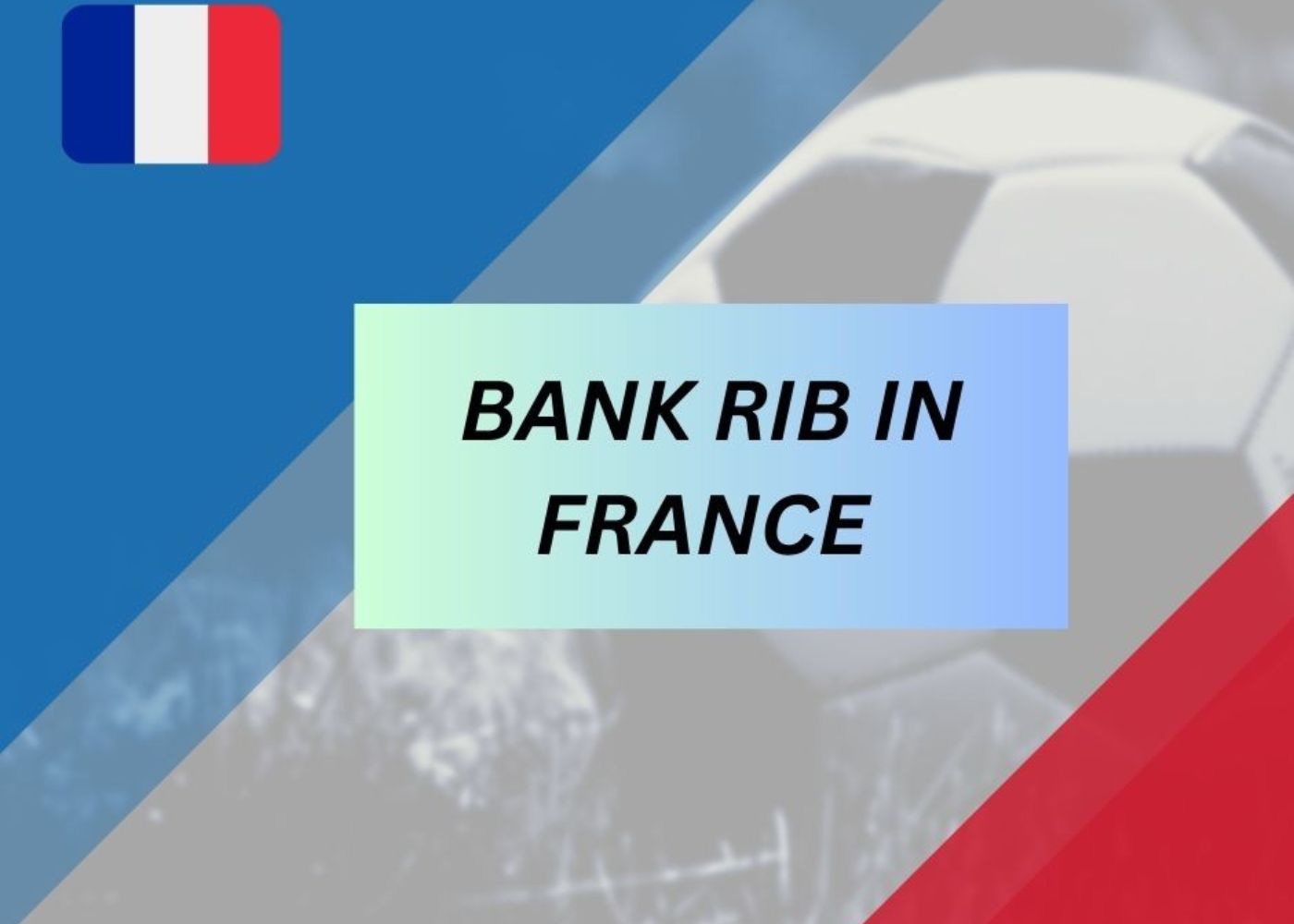WHY DO YOU NEED RIB IN FRANCE IN 2024?
As we delve deeper into its components and uses, you’ll discover how mastering the nuances of the bank RIB in France can elevate your financial literacy in France to new heights. The RIB, or Relive d’Identité Bonaire, is essentially your French bank account’s ID card. It contains all the crucial information needed for smooth financial transactions in France. The humble RIB makes these conveniences possible by providing all necessary banking details in one concise document.
BANK RIB IN FRANCE
A bank RIB in France, short for Relevé d’Identité Bancaire, is essentially your key to streamlined financial transactions within the country. This handy document contains crucial information such as your account number (Numéro de Compte), bank code (Code Banque), branch code (Code Guichet), and SWIFT/BIC codes. With the RIB, you can effortlessly facilitate direct deposits, set up automatic debits for bills, or receive payments without any fuss of lengthy procedures.
What makes a bank RIB particularly invaluable is its role in digital banking. When engaged in day-to-day activities like online shopping or paying service providers, sharing your RIB ensures that funds are accurately routed with minimal delay. It pops up naturally when filling out forms for employment salary transfers or even casual peer to-peer money exchanges among friends and family. This all in-one info sheet not only elevates personal financial management but also builds confidence in secure banking practices by minimizing errors associated with manual entries.
WHY DO YOU NEED ONE ?
RIB, or Relevé d’Identité Bancaire, holds significant importance in France for anyone dealing with financial transactions. Whether you’re a resident or just visiting, having your RIB at hand simplifies processes such as setting up utilities, receiving direct deposits from employers, and paying rent. This document contains all the critical information needed to initiate transfers within French banks—like IBAN (International Bank Account Number) and BIC (Bank Identifier Code), thus safeguarding accuracy and security.
Not only does the RIB facilitate everyday transactions smoothly, but it also boosts trust among business partners. When engaging in contractual agreements or larger financial commitments like securing loans or buying property, providing a legitimate RIB can assert credibility. Essentially acting as your banking identity card within the French system, it becomes a fundamental aspect of ensuring that monetary exchanges are executed efficiently and without delay.
HOW DO YOU GET A RIB ACCOUNT ?
To get a RIB account, begin by researching different banks that offer this service and comparing their features. Once you’ve selected a bank, visit their website or contact the branch to inquire about the application process. you’ll need to provide identification documents, proof of address, and perhaps income verification.
The benefits of having a RIB account are vast from seamless international transactions to better interest rates on savings accounts. Moreover, having a RIB account enables you to easily manage your finances through online banking platforms and mobile apps. The streamlined process also includes receiving alerts for transactions and easy bill payments.
WHEN DO YOU NEED A RIB IN FRANCE ?
A RIB, or Relevé d’Identité Bancaire, is a crucial document in France that serves as proof of your banking details. It is required for various financial transactions such as setting up direct debits, paying bills online, and receiving salary payments. Without a valid RIB, you may encounter obstacles in managing your finances effectively in France.

If you are moving to France for work or study purposes, obtaining a RIB is essential to connect with the local banking system. It streamlines processes like opening a bank account and ensures smoother integration into the financial landscape of the country. Having a RIB also signifies your commitment to compliance with French regulations and facilitates seamless transactions within the French banking network.
understanding when you need a RIB in France can significantly impact your financial operations and simplify administrative tasks during your stay. Recognizing its importance early on will help you navigate through various financial procedures with confidence and ease.
You should need to know about how to pay for London:
WHERE DO YOU FIND YOU RIB IN FRANCE
Your RIB, or Rigid Inflatable Boat, can be found in a variety of places depending on your needs and preferences. For those seeking adventure on the open water, waterfront marinas or boat clubs often offer opportunities to rent or purchase RIBs for recreational use. Alternatively, specialized boating stores and online marketplaces provide a range of options for buyers looking to invest in their own vessel.
WHAT IS THE DIFFERENCE BETWEEN RIB, SWIFT, BIC, IBAN ?
Understanding the differences between RIB, IBAN, BIC, and SWIFT codes is crucial in the world of banking and international transactions. While RIB (Relevé d’Identité Bancaire) is a French bank identifier used for domestic transactions only, IBAN (International Bank Account Number) is an internationally recognized format that identifies specific bank accounts globally.
On the other hand, BIC (Bank Identifier Code) identifies individual financial institutions internationally and works alongside SWIFT (Society for Worldwide Interbank Financial Telecommunication) codes to facilitate secure global transactions.

When it comes to efficiency and security in international transactions, IBAN and SWIFT are often considered superior due to their standardized formats and widespread acceptance. The IBAN eliminates errors by providing a consistent structure for identifying bank accounts across borders, making it easier to process payments accurately. Meanwhile, the SWIFT code ensures that financial institutions can securely communicate information about money transfers without the risk of interception or fraud.
WHAT INFORMATION IS INCLUDED IN RIB ?
A RIB (Relevé d’Identité Bancaire) document in France contains essential information for identifying and managing bank accounts. It typically includes the account holder’s name, IBAN (International Bank Account Number), BIC (Bank Identifier Code), and the name and address of the bank. This information is crucial for conducting financial transactions, both domestically and internationally.
A RIB also often includes details such as the branch number, account number, and other specific identifiers unique to the individual’s bank account. By having this detailed information readily available on a RIB document, individuals can easily set up direct debits or transfers, receive payments from employers or government agencies, and provide proof of their banking details when necessary.
IS IT SAFE TO HAND OUT YOUR FRENCH RIB
Handing out your French RIB (Relevé d’Identité Bancaire) can pose a significant risk and threat to your financial security. While it may be necessary in certain situations, such as setting up direct debits or receiving payments, it’s crucial to exercise caution. By sharing this banking information with others, you are potentially exposing yourself to fraud and unauthorized transactions.

Once someone has your French RIB, they may be able to access sensitive personal information connected to your bank account. This could lead to identity theft or other forms of fraudulent activity that can have long lasting consequences. It is important to always verify the legitimacy of any request for your banking information and only share it with trusted entities.
FINAL THOUGHTS
From the stunning natural beauty of the French Alps to the charming villages along the Rhône River, there is something for everyone to enjoy. The region’s culinary scene is also a highlight, with world-renowned dishes and wines waiting to be savored. Whether you’re seeking adventure in the great outdoors or looking to immerse yourself in French culture and history, RIB in France is sure to leave a lasting impression. Plan your next trip to this enchanting destination and experience all that Rhône Alpes has to offer firsthand.
FAQs
What is RIB in France banking?
What is a RIB? A RIB (“relevé d’identité bancaire” in French) is a document that has information about a person’s identity and bank details. Your RIB lets you share your bank details with others for example, so that you can receive transfers or pay bills by direct debit.
Is a rib the same as a swift code?
In summary, the RIB is a number containing different information useful for correctly undertaking banking operations (transfers and direct debits). It is established fully as a bank identity card. Among this information: the SWIFT or IBAN, necessary for transferring money, especially abroad.
Are rib and bic the same?
The RIB includes the name and address of your bank and branch, your personal details, and your unique BIC (bank code) and IBAN number. These numbers are essential for conducting banking transactions such as international money transfers and direct deposits.
Which is the best bank in France?
BNP Paribas had the highest return on capital ratio (10.61 per cent) of French banks The Banker ranks in the annual Top 1000 ranking, and the highest return on assets (0.44 per cent).
What is rib eye in France?
In French cuisine, the entrecôte corresponds to the rib eye steak, while rib steak is called côte de bœuf (literally: “beef rib”).
What is the full form of rib?
A residual interest bond (RIB) is a municipal bond that has been split into two segments. The first segment of a RIB is a residual inverse floating-rate bond and the second segment is a primary direct floating-rate bond.
What is a SWIFT code in France?
BANQUE DE FRANCE SWIFT Code Details
A SWIFT/BIC is an 8-11 character code that identifies your country, city, bank, and branch. Bank code A-Z4 letters representing the bank. It usually looks like a shortened version of that bank’s name.
What does my rib mean?
The ‘rib’ in a relationship refers to the qualities you lack such as organization skills, time management, spiritual growth, study skills, leadership skills, etc.







